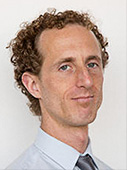Bipolar Disorder Treatment in North Hollywood, CA

Bipolar disorder, formerly referred to as manic depression, is a type of mood disorder. With a defining characteristic of rapid switching between extreme moods, bipolar disorder can drastically impact the lives of patients.
Fortunately, bipolar disorder is treatable; if you are looking for a North Hollywood bipolar disorder specialist, call (424) 365-1800 or contact Dr. Jeremy Fischer online.
What is Bipolar Disorder?
Bipolar disorder is almost always characterized by two emotional extremes: depression and mania.
Depressive episodes can last upwards of six months, and those in the midst of a depressive episode often find themselves experiencing fatigue, apathy, and self-hatred.
Mania, which can last for up to three months, is the opposite of depression, with an elevation of mood (euphoria, cheerfulness, or irritability) that is often accompanied by impulsive, risk-seeking behavior.
Many patients with bipolar disorder go through periods during which they experience no symptoms; this return to their normal self - called a eurythmic period - is often a short-lived break before cycling into the other extreme mood.
Bipolar Disorder Symptoms
Bipolar symptoms always include mania and almost always include alternating episodes of depression and mania. However, there are multiple types of mania. Multiple types of bipolar disorder exist as well, characterized by the nature and duration of symptoms.
Types of Mania
There are several types of mania:
- Acute mania: An extremely elevated mood characterized primarily by delusions of grandeur. People with acute mania can become irritable or angry if their delusions are questioned. Other symptoms include increased energy, racing thoughts, poor decision-making, and excessive talkativeness.
- Hypomania: A milder form of acute mania, hypomania is typically associated with a flood of thoughts and ideas, increased energy, abnormally high stamina, hyperactivity, and forced and fast speech. Impulsivity - including unpredictable actions, reckless spending, and hypersexual behavior - is common, as is spontaneous and extreme irritability.
- Delirious mania: The most extreme form of mania, delirious mania is characterized by delusions and hallucinations that change depending on mood. If a patient is elated, delirious mania can seem like heaven, but if irritable, the delusion can mimic hell. People in a delirious mania have largely unintelligible speech and behave unpredictably.
Types of Depression
Bipolar depression is not divided into types like mania, as the main difference between the depressive episodes experienced by patients with bipolar disorder is the duration of the depressive episodes. However, some patients with bipolar disorder experience hallucinations, psychosis, or delusions during their depressive periods; this is referred to as psychotic depression.
Types of Bipolar Disorder
According to the fifth edition of the Diagnostic and Statistical Manual of Mental of Mental Disorders (DSM-5), there exist four types of bipolar disorder:
- Bipolar I disorder: Bipolar I patients experience manic and depressive episodes. At least one manic episode is needed to confirm bipolar I, as are episodes that last over 7 days or require hospitalization. Bipolar I may or may not present with a depressive state.
- Bipolar II disorder: Patients with bipolar II cycle between depression and hypomania, never reaching full mania.
- Cyclothymic disorder: Patients experience a near continuous state of hypomania and mild depression. Eurythmic states (normal moods) may appear, but do not last beyond 2 months.
- Other specified bipolar and related disorder: Replacing bipolar disorder not otherwise specified, this is diagnosed if episodes of mania and depression are severe, but don't fit the time limits of other bipolar disorders.
An affective disorder that is related to bipolar disorder is disruptive mood dysregulation disorder (DMDD). This diagnosis was developed to help curb over-diagnosis of bipolar disorder in younger affective disorder patients. DMDD focuses on children who throw excessive or atypical tantrums, and teenagers who display drastic changes in mood/interests. The difference between DMDD and bipolar disorder is the presence of persistent irritability in DSDD that is not present in patients with bipolar disorder.
Treatment of Bipolar Disorder
There are a number of effective treatment options for controlling bipolar disorder, with medication and therapy being the most common. Medications for bipolar disorder may include:
- Antidepressants
- Mood stabilizers
- Atypical antipsychotics, which can curb psychosis and mania
- Combination antidepressant-antipsychotics
- Anxiolytics, which treat anxiety
Certain forms of talk therapy, particularly [[crosslink:'cognitive-behavioral-therapy','Cognitive behavioral therapy']] (CBT) and interpersonal and social rhythm therapy (IPSRT), have been found to help patients with bipolar disorder. CBT helps patients identify and change maladaptive thinking patterns and emotional responses, and can be particularly useful for combating bipolar depression. IPSRT can be helpful for bipolar patients because it is focused on developing a consistent routine, which allows for better mood management.
Electroconvulsive therapy (ECT) may be used in severe cases that are not treatable with medication. During ECT, electrical currents are passed through the brain to trigger a brief seizure. While this treatment may cause memory loss, it alters brain chemistry in such a way that symptoms of bipolar disorder may be reversed.
Request Your Appointment Today
“What is bipolar disorder?” can be a complicated question to answer, considering how diverse this condition is. Almost all patients with bipolar disorder can benefit from treatment, no matter what the exact diagnosis may be.
To request more information and speak with a North Hollywood bipolar disorder specialist, call (424) 365-1800 or contact Dr. Jeremy Fischer online.
Vitality Integrative Medicine
Address
4849 Van Nuys BlvdSuite 104
Sherman Oaks, CA 91403
(424) 365-1800
www.vitalityintegrative.com
Hours
Mon:
8:00 am - 6:00 pm
Tue:
8:00 am - 6:00 pm
Wed:
8:00 am - 6:00 pm
Thu:
8:00 am - 6:00 pm
Fri:
8:00 am - 6:00 pm
Sat:
8:00 am - 12:00 pm

